Mike Deleon will be a father in February. He has his own apartment, bank account and cell phone. In October, he got hired at Baywood Golf and Country Club as a dishwasher. And he works on his passion -- music -- as much as he can.
This may not seem like much to brag about, but Mike has come a long way in the last year.
Like many 22-year-old guys, he loves the 49ers and Tupac, listens to anything with "that real West Coast energy." His ginger-colored hair is slicked back, almost greaser-style. Though not very tall, he has the build of someone you wouldn't want to mess with. His deep brown eyes are full of kindness; a teardrop tattoo pours from the left eye, a labret stud adorns his bottom lip and a silver link chain hangs from his neck.
Eva Dickson has the physique of a pixie and long, wavy, blonde hair. Her bright green eyes and full smile are warm and inviting. Though born in Burbank, her family moved to Humboldt County when she was 7. At 12, her mother left. Her father, Rick Beckman, raised Eva and her younger sister from that point on. "I had to take care of my little sister [Julie] and the house a lot of the time" she says. You can hear the love in Eva's voice when she mentions Julie, but when asked about her older brother her reply is sharp. "He's a dick," she blurts out "I don't talk about him. In fact, let's not even say his name."
At 13, Eva began experimenting with drugs. At first it was just to be cool, but after a while she just wanted to numb the pain inside, and the whiskey and meth did just that. "It didn't get really bad until after high school ... especially after my husband [Doug] and I broke up." she recalls. At one point she ended up in the hospital with kidney problems related to her drinking and drug use. But she didn't change her lifestyle until Aisha came along. Aisha is now 3.
"When I found out I was pregnant with her I quit doing drugs, I quit running around with the wrong kind of people, and just really buckled down" she says. Not long after, Eva came to work at Angels of Hope Thrift Store, through the Welfare-to-Work program.
Like Eva, Mike's family moved to Humboldt County when he was young. His family came from Sacramento. He spent a large portion of his childhood living with his grandmother. As Mike looks down at his fountain drink and plays with the straw he mentions that his mother came in and out of his life during this time. At around 15 he and his twin brother, Nick, were put into foster care. Thanks to the efforts of dedicated counselors, Mike and Nick were able to get into the same foster home -- a luxury many siblings don't get.
From then on both boys began getting into trouble. Mike was in and out of juvenile hall several times. His eyes flash a look that makes it clear he'd rather not go into detail. "I was runnin' around with adults, doing things that I shouldn't have been doing." After a while he came to the point where he had nowhere left to go, and it was time to make a change.
Down on 10th Street in Arcata, within an unassuming warehouse that blends with its surroundings, lies Angels of Hope Thrift Store. A small standalone sign marks the entrance to the parking lot. At first glance it is like any other thrift store. When you walk through the glass door it smells like grandma's house without the cooking, like something aged. In front of you is one huge room with racks of clothes, a maze of aisles containing unknown surprises. The ceilings are high and the florescent lights are a little obtrusive. There is an orderly chaos here -- you see everything from baby booties to irons, from stemware to coffee tables -- and yet everything has its place.
Many items inside have passed through multiple households, and they carry with them memories from each family: a sippy cup bears the name "Robert" in rainbow letters, a brown leather-bound photo album with gold Old English script that reads "Memories of the Liksey's," a faded Lawrence Welk record, a set of glass salt shakers with pointed tops. They all get dropped off at Angels of Hope Thrift, the last stop just before the garbage can.
Angels of Hope was founded by Rose Baker and Lisa Callahan, both of whom were foster parents to hundreds of kids for many years. According to the store's Web site, in 1991 Rose's son was dying of cancer when she made him a promise. From that promise emerged Angels of Hope, which opened in 2006 as a way to help at-risk youth learn skills to improve their work ethics and social skills. The store teamed up with government programs such as Independent Living Skills (ILS) and Welfare-to-Work, which referred individuals to the store for job training. The name of the nonprofit agency that Baker and Callahan started -- the agency that now operates Angels of Hope -- is called Youth Ability.
Welfare-to-Work is a state-funded program in which all able-bodied welfare recipients are required to participate. The program provides job preparation, on-the-job training, vocational training and other services geared towards getting participants into unsubsidized jobs. ILS is a program for foster youth that helps with the transition to living on their own, but ILS runs out the day before their 21st birthday. This program, which runs out when the kids turn 21, provides workshops, classes and individual services to help foster youth develop life, work and social skills.
Shannon Hardin is the manager at Angels of Hope. She is tall and slender with long chestnut hair tied back in a sloppy bun. One long earring dangles from her right ear; it is surrounded by a couple of studs and some unoccupied earring holes. She has a nose ring and a tattoo that peeks out from under the left sleeve of her Zeppelin T-shirt. She has big brown eyes and a sly smile that can hide her toughness. ("[Shannon] makes work really enjoyable, really comfortable," says Deleon, "but she also knows how to get us in line, and keep us on top of our shit.")
Unlike almost everyone else at the store, Shannon got the job the traditional way: through Craigslist. She is one of three people who get paid from the store's profits. When she applied for the position Shannon had no idea about the Youth Ability program or the training that was done at the store. Once she realized that it wasn't just another retail job she became even more interested.
"We've gotta get this iPod thing figured out," says Eva to Shannon on her way out of the office. "This is important stuff." Shannon explains that everyone is sick of the music and the two of them were trying to load more songs to play. "There's always something to do," she says. "Just when I think I have the store [perfect] I find some other way to make it better."
Mike was referred to Angels a few months before his support at ILS ran out. His brother Nick had already been working there when Mike arrived in May of 2009. Angels "has been a blessing," says Mike, his voice shaking a little as he says the words. On his first day he was very quiet and shy, says Eva, "but you could tell by the look in his eyes that he was just taking it all in." Mike says at first he was just thankful to have a job and wanted to try his best. "I was ready to do anything it took," he recalls.
His first training was with Eva. They sorted kids' clothes. Mike had never had a real job before and was at the end of the line in terms of foster care assistance. "I think he was at a crossroads," says Eva. "When he started he wasn't that secure and well spoken." She showed him how to determine sizes, mark the prices and where everything should be located in the store. "She was very patient," says Mike. "She would show me something and if I didn't get it, like, right away she would show me again until I did."
In his time at Angels of Hope, Mike learned how to show up on time, work the register and express himself well. "When he started he used to have kind of a stutter," says Eva. "And now he hardly ever does." As time went on Mike learned all of the basic work skills he needed. He started off sorting clothes and eventually learned the register after observing Nick for a while.
Eva thinks a lot of the progress the youth make in the program has to do with the way that they handle interaction -- the low-pressure atmosphere. This means that if someone spends all day organizing the sporting goods shelf, you don't point out what they did wrong first. "I make sure to praise them for everything that's done right and then say, 'Maybe it would be better if ...' or 'Next time we should try it this way,'" says Eva. Even if someone doesn't do a single thing right all day but makes an honest effort, Eva says, "at the end of the day I [still] make sure to let ’em know, y'know, 'You did a really good job and I'm really glad to have you.' That kind of thing."
To Mike the best part of the store was the support he got from the people there. "They really help you out a lot," he says, flashing a smile that exposes his missing tooth. "Like, if you need something, like clothes or dishes or anything really, they will try to get it for you."
The store lets the staff look through the donations before they go out on the racks to see if there is something they need. Former employees still stop by to say hello or bring someone pizza. When business is slow the girls spend time gossiping about the little things in life in the clothes room. "There's a lot of laughing in there," says Eva.
In addition to the social support that the store provides, Angels also teaches fundamental job skills. Those who train here learn the concepts of showing up for their shift, what to wear to interviews, how to clock in, why their pay reflects the hours they put in, and so on. Mike says he learned to "just man up, like, get your money straight." According to Shannon the fundamentals are not being taught "to kids in the foster system who get bounced around or who are homeless ... [they] really don't have the basic skills necessary to get and maintain a job, and they can kind of work that out here with a forgiving environment and some structure."
Shannon hopes to see the program expand through government grants and increased business. "We could offer them more time here and more training on our own dollar, as opposed to through [government programs]," Shannon says. She would like to see more living skills incorporated into the training, like how to open and balance a bank account, how to interview -- "skills to help them set up a life after foster care for themselves in the community."
The type of training received at Angels depends largely on the program with which the individual is involved. Those who come though ILS tend to not have much, if any, prior work experience, and therefore need more extensive training than those who come through Welfare-to-Work. Furthermore, since each person has different abilities and skills, the rate at which they are able to learn each task varies.
The government programs that direct youth to Angels of Hope also pay them for the hours they work. The store is able to provide such low prices because they only have to make enough to maintain the store. Their only costs are the overhead on the building, the electricity, rent and so on, and the three employees. Everyone else who works at the store is paid by ILS, Welfare-to-Work or another participating program, or is a volunteer.
When her case worker was trying to help Eva figure out what she wanted to do, Eva say all she could come up with was things she didn't want to do, like office work and traditional retail. "When [the case worker] mentioned the thrift store I kind of perked up and said, 'Well, that sounds nice,'" Eva says.
She started off only working two five-hour shifts a week and has since been hired by the store full-time. She is now one of the store's three regular employees. Nowadays she coordinates the employees and assigns them their daily tasks, answers any questions from people dropping off donations or customers and runs the store in the manager's absence. At times it gets hectic.
"Every time I'm getting into a project I get interrupted," she says. As soon as she utters the sentence, one of the newer employees, Chelsea, walks up. "What should I charge this guy for the trundle bed?" she asks Eva. "Thirty bucks," Eva replies, then swiftly changes her mind. "Eh, give it to him for $25." Eva turns and chuckles: "See what I mean?"
Through programs like Youth Ability, young people in difficult situations can learn to get out on their own with the basic work skills they need to keep themselves off the streets. According to Shannon and Eva, Mike has made significant progress in his time at the store. He always went above and beyond what was expected of him. "He was my favorite employee ever," says Eva. "He was the kind of guy that would clock out at the end of the day and still stay and finish what needed to be done. He would always grab the heavy box out of my hands and take it up the stairs."
Mike's diligence has translated well into his new job at Baywood Golf and Country Club. "He is a hard worker," says head chef Shammah Sulouff. "He is willing to try anything [asked of him], and is not afraid to learn or make mistakes."
Mike says he is really enjoying his new job but that it is a totally different atmosphere than the store. "At [Angels] he was in a world of females surrounded by clothes," says Shammah. "Here, most of the employees are men. He seems to like the camaraderie. He is always smiling, always positive."
Mike, Eva and Angels of Hope stand as a reminder that job training programs can and do succeed.
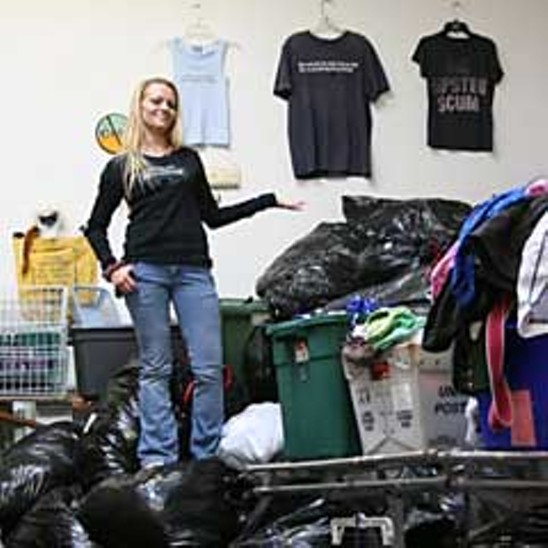
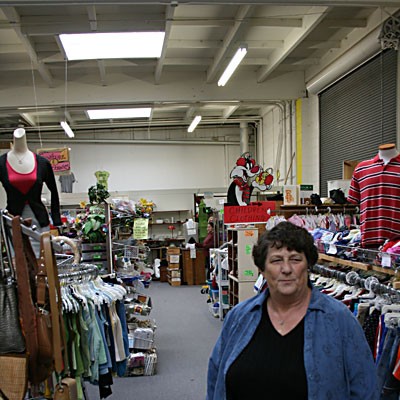
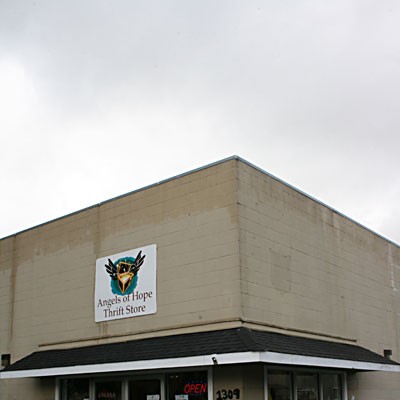
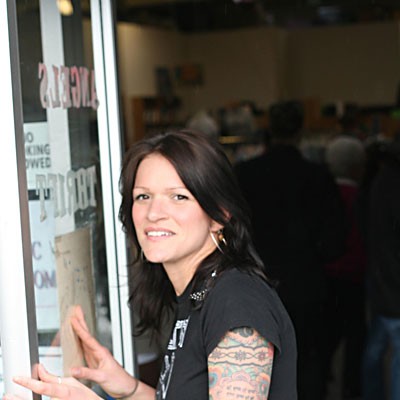

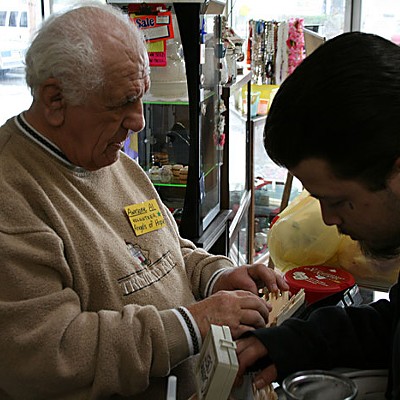


Comments (5)
Showing 1-5 of 5